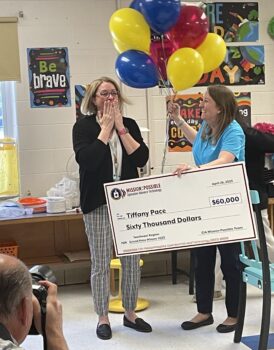CROSS LANES, W.Va. — A middle-of-the week surprise for one elementary school teacher and her classroom of STEM learners.
Tiffany Pace and her STEM class at Cross Lanes Elementary were winners of the CIA Mission Possible Operation Advance Technology Competition, receiving the $60,000 grand prize from ORISE, the Oak Ridge Institute for Science and Education.
“We just went wild, it was awesome,” said Pace about her and her students realizing they were winners of their region.
This was the first CIA Mission Possible competition, which was open to kindergarten through eighth-grade students. The competition turned out to be a random occurrence for Pace and her classroom. She said she found about about the competition by looking through her email.
The answer from the young STEM students was an easy one on whether or not they wanted to take on the highly competitive competition.
“We have to do this, we have to go for this,” one of Pace’s students said.

Sure enough, the class was surprised Wednesday as winners of the entire southwest region.
Plans for the use of the money are already in place according to Pace. She said they will work with the ORISE organization on adapting the use of the money to the size of the classroom.
Initially, ORISE said winners will receive 30 laptops, a charging station, and coding equipment, but since Pace’s class has around 25 students, they could use the additional money not going towards extra laptops into their choice of coding equipment.
The same awards were given out in five different regions of the country. Pace and her classroom won the southeast region, the region with the most applicants.
“Out of the southeast region, there were more people that applied than any other region, thousands applied,” according to Pace, who was told that by an ORISE representative.
The difference according to her on why they won was simply her students and their passion for STEM.
“What really stood out was our kids showed a passion to learn coding for their STEM careers,” said Pace.
Kids in Tiffany Pace’s class learn coding through what she calls block coding. The kids learn how to make commands to then create a function. Pace said some of her kids want to learn coding with robots, and creating games, music, and even drawings.
STEM has always been a passion for Pace too.
“I felt that students who didn’t excel in math or reading could always excel in STEM because they always knew how to think outside the box,” she said.


